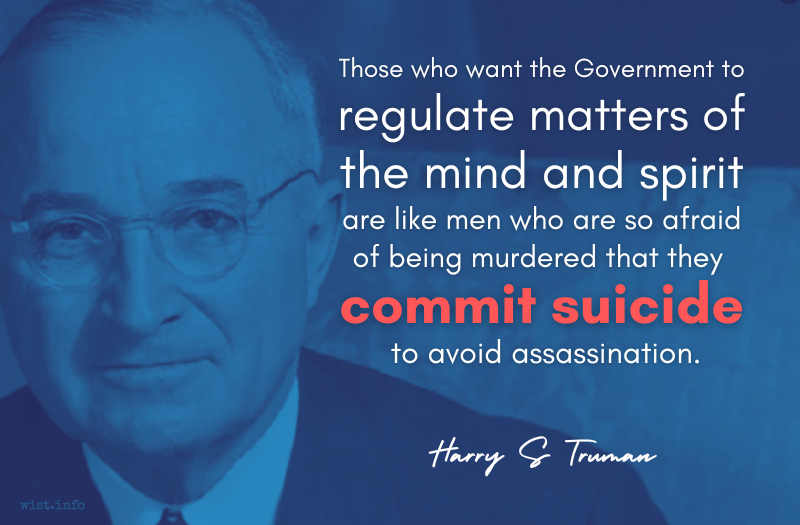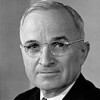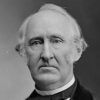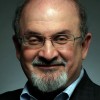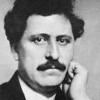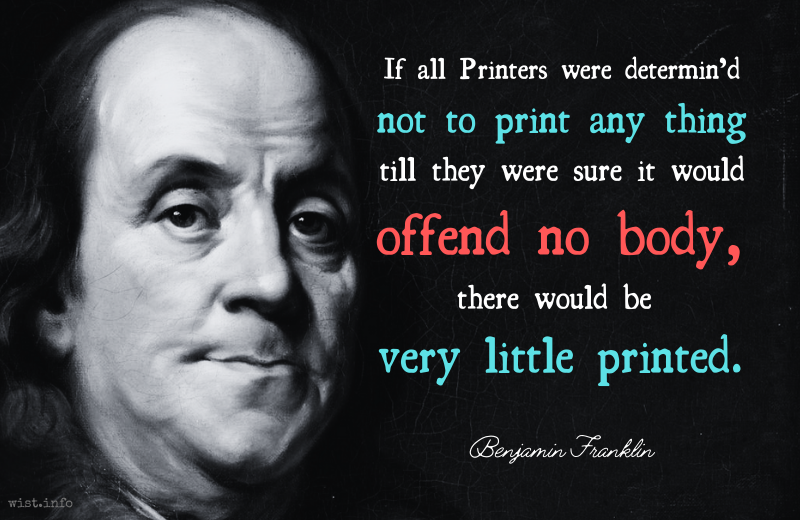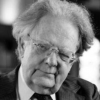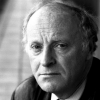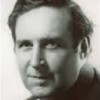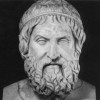However that may be, it is always disastrous when governments set to work to uphold opinions for their utility rather than for their truth. As soon as this is done it becomes necessary to have a censorship to suppress adverse arguments, and it is thought wise to discourage thinking among the young for fear of encouraging “dangerous thoughts.” When such mal-practices are employed against religion as they are in Soviet Russia, the theologians can see that they are bad, but they are still bad when employed in defence of what the theologians think good. Freedom of thought and the habit of giving weight to evidence are matters of far greater moral import than the belief in this or that theological dogma. On all these grounds it cannot be maintained that theological beliefs should be upheld for their usefulness without regard to their truth.
Bertrand Russell (1872-1970) English mathematician and philosopher
“Is There a God?” (1952)
(Source)
Essay commissioned by Illustrated magazine in 1952, but never published there. First publication in Russell, Last Philosophical Testament, 1943-68 (1997) [ed. Slater/Köllner].
Quotations about:
censorship
Note not all quotations have been tagged, so Search may find additional quotes on this topic.
But, indeed, the dictum that truth always triumphs over persecution, is one of those pleasant falsehoods which men repeat after one another till they pass into commonplaces, but which all experience refutes. History teems with instances of truth put down by persecution. If not suppressed forever, it may be thrown back for centuries.
Can’t you understand that if you take a law like evolution and make it a crime to teach it in public schools, tomorrow you could make it a crime to teach it in private schools, and tomorrow you may make it a crime to read about it? And soon you may ban books and newspapers. And then you may turn Catholic against Protestant, and Protestant against Protestant, and try to foist your own religion upon the mind of man. If you can do one you can do the other, because fanaticism and ignorance is forever busy and needs feeding.
Nedrick Young (1914-1968) American screenwriter and actor [pseud. Nathan E. Douglas]
Inherit the Wind, film (1960) [with Harold Jacob Smith]
(Source)
The original 1951 play was written by Jerome Lawrence and Robert E. Lee, but does not include this line, delivered in the film by Spencer Tracy. Young and Smith share the screenwriting credits.
I am beginning to feel a little more like an author now that I have had a book banned. The literary life, in this country, begins in jail.
E. B. White (1899-1985) American author, critic, humorist [Elwyn Brooks White]
Letter to Stanley Hart White (1944-06)
(Source)
On reading that the US Army and Navy had refused to publish an "Armed Services Edition" of his Harper's magazine essay collection, One Man's Meat (1942), for "political implications." The decision was later rescinded.
But the truth is, that when a Library expels a book of mine and leaves an unexpurgated Bible lying around where unprotected youth and age can get hold of it, the deep unconscious irony of it delights me and doesn’t anger me.
Mark Twain (1835-1910) American writer [pseud. of Samuel Clemens]
Letter to Mrs. F. G. Whitmore (1907-02-07)
(Source)
Those who want the Government to regulate matters of the mind and spirit are like men who are so afraid of being murdered that they commit suicide to avoid assassination.
Every time you get a censor, you get a fool, and worse yet a knave, pretending to be a guardian of morality, while acting as a guardian of class greed.
Upton Sinclair (1878-1968) American writer, journalist, activist, politician
Money Writes!, ch. 22 “The Bookleggers” (1927)
(Source)
Self-quoted in "Poor Me and Pure Boston," The Nation (1927-06-29)
Assassination is the extreme form of censorship.
George Bernard Shaw (1856-1950) British playwright and critic
The Shewing-up of Blanco Posnet, “The Rejected Statement, Part 1,” “The Limits to Toleration” (1909)
(Source)
He who stifles free discussion, secretly doubts whether what he professes to believe is really true.
Wendell Phillips (1811-1884) American abolitionist, orator, social activist
Speech, Daniel O’Connell celebration, Boston (1870-08-06)
(Source)
Heretical views arise when the truth is uncertain, and it is only when the truth is uncertain that censorship is invoked.
Bertrand Russell (1872-1970) English mathematician and philosopher
“The Value of Free Thought” (1944)
(Source)
One knows not whether nature doth not impose some secrecy upon him who has been privy to certain things. At least, it is to be doubted whether it be good to blazon such. If some books are deemed most baneful and their sale forbid, how, then, with deadlier facts, not dreams of doting men? Those whom books will hurt will not be proof against events. Events, not books, should be forbid.
An attack upon our ability to tell stories is not just censorship — it is a crime against our nature as human beings.
Salman Rushdie (b. 1947) Indian novelist
“Public Event, Private Lives,” speech, University of Colorado, Boulder (2013-04-17)
(Source)
To whom do you award the right to decide which speech is harmful, or who is the harmful speaker? Or to determine in advance what are the harmful consequences going to be that we know enough about in advance to prevent? To whom would you give this job? To whom are you going to award the task of being the censor? Isn’t a famous old story that the man who has to read all the pornography, in order to decide what’s fit to be passed and what is fit not to be, is the man most likely to become debauched? Did you hear any speaker in the opposition to this motion, eloquent as one of them was, to whom you would delegate the task of deciding for you what you could read? To whom you would give the job of deciding for you — relieve you of the responsibility of hearing what you might have to hear? Do you know anyone? Hands up. Do you know anyone to whom you’d give this job? Does anyone have a nominee?
History proves there is no better advertisement for a book than to condemn it for obscenity. Forbidden fruits have unique flavors, and the bounds of suppression create new limits of desire.
Holbrook Jackson (1874-1948) English journalist, editor, author
The Fear of Books, Part 2, ch. 1 (1932)
(Source)
If all the People of different Opinions in this Province would engage to give me as much for not printing things they don’t like, as I can get by printing them, I should probably live a very easy Life; and if all Printers were every where so dealt by, there would be very little printed.
Benjamin Franklin (1706-1790) American statesman, scientist, philosopher, aphorist
“Apology for Printers,” Philadelphia Gazette (1731-06-10)
(Source)
A mind unfree, a mind possessed, dragooned, or indoctrinated, does not learn. It copies. Learning implies discovery. The unfree mind looks at maps but does not travel. It dares not. For at the edge of maps is the jumping-off place, full of dragons and sea serpents. The unfree mind stays home, locks the door, bars the shutters. It is a hero in a crowd, a coward in solitude; it is a slave and a sloth.
Whitney Griswold (1906–1963) American historian, educator [Alfred Whitney Griswold]
“Freedom, Security, and the University Tradition,” speech, Columbia University Bicentennial (1954-06-02)
(Source)
Reprinted in Griswold, In the University Tradition (1957).
It is unreasonable to imagine Printers approve of every thing they print, and to censure them on any particular thing accordingly; since in the way of their Business they print such great variety of things opposite and contradictory. It is likewise as unreasonable what some assert, That Printers ought not to print any Thing but what they approve; since if all of that Business should make such a Resolution, and abide by it, an End would thereby be put to Free Writing, and the World would afterwards have nothing to read but what happen’d to be the Opinions of Printers.
Benjamin Franklin (1706-1790) American statesman, scientist, philosopher, aphorist
“Apology for Printers,” Philadelphia Gazette (1731-06-10)
(Source)
These poor afflicted creatures spend their time with an ear against the speaker counting occurrences of the word bugger. If I had a large amount of money I should certainly found a hospital for those whose grip upon the world is so tenuous that they can be severely offended by words and phrases and yet remain all unoffended by the injustice, violence and oppression that howls daily about our ears.
Stephen Fry (b. 1957) British actor, writer, comedian
“Trefusis on Any Questions,” Loose Ends, BBC Radio 4 (c. 1987)
(Source)
Reprinted in Paperweight (1992).
The suggestion that the world could be completely other than it is always annoys those who are content with the way things are. Stories of imagination tend to upset those without one. Rulers are suspicious of new worlds where their writ does not run. Jailers don’t like escapism.
Terry Pratchett (1948-2015) English author
Foreword to David Pringle, ed., The Ultimate Encyclopedia of Fantasy (1999)
(Source)
Often just given as "Stories of imagination tend to upset those without one."
That hence arises the peculiar Unhappiness of that Business, which other Callings are no way liable to; they who follow Printing being scarce able to do any thing in their way of getting a Living, which shall not probably give Offence to some, and perhaps to many; whereas the Smith, the Shoemaker, the Carpenter, or the Man of any other Trade, may work indifferently for People of all Persuasions, without offending any of them: and the Merchant may buy and sell with Jews, Turks, Hereticks, and Infidels of all sorts, and get Money by every one of them, without giving Offence to the most orthodox, of any sort; or suffering the least Censure or Ill-will on the Account from any Man whatever.
Benjamin Franklin (1706-1790) American statesman, scientist, philosopher, aphorist
“Apology for Printers,” Philadelphia Gazette (1731-06-10)
(Source)
I find it difficult to see how talk about sex can be placed under the kind of censorship the Court here approves without subjecting our society to more dangers than we can anticipate at the moment. It was to avoid exactly such dangers that the First Amendment was written and adopted. For myself I would follow the course which I believe is required by the First Amendment, that is, recognize that sex at least as much as any other aspect of life is so much a part of our society that its discussion should not be made a crime.
Hugo Black (1886-1971) American politician and jurist, US Supreme Court Justice (1937-71)
Ginzburg v. United States, 383 U.S. 463, 482 (1966) [dissent]
(Source)
If all Printers were determin’d not to print any thing till they were sure it would offend no body, there would be very little printed.
Benjamin Franklin (1706-1790) American statesman, scientist, philosopher, aphorist
“Apology for Printers,” Philadelphia Gazette (1731-06-10)
(Source)
Our Constitution assumes that the common sense of the people and their attachment to our country will enable them, after free discussion, to withstand ideas that are wrong. To say that our patriotism must be protected against false ideas by means other than these is, I think, to make a baseless charge. Unless we can rely on these qualities—if, in short, we begin to punish speech — we cannot honestly proclaim ourselves to be a free Nation and we have lost what the Founders of this land risked their lives and their sacred honor to defend.
Hugo Black (1886-1971) American politician and jurist, US Supreme Court Justice (1937-71)
Barenblatt v. United States, 360 U.S. 109, 146 (1959) [dissent]
(Source)
The problem of censorship in television is not only a writer’s problem. What narrows his frame of reference must of necessity narrow the area of television entertainment available to the audience. When the television drama is forced to go around Robin Hood’s barn tying itself into verbal knots to evolve as stainlessly nonpartisan, whatever nonsense comes out as the replacement is the nonsense that an audience must live with on its television sets. Perhaps if some thoughtful people would write to sponsors, pleading for an adult airing of issues on a dramatic program, to counteract those cranks who hoist up the Stars and Bars whenever a play suggests a racial controversy, the sponsor or agency would realize that not to attack a controversial theme might be just as destructive as attacking it.
Rod Serling (1924-1975) American screenwriter, playwright, television producer, narrator
Patterns, Introduction (1957)
(Source)
Despite everything, despite our controversies and despite what is apparently and tragically a sense of divisiveness that permeates our land, and despite riots and rebellions that go hand-in-hand, mind you, with repression and brutality, one major and fundamental guarantee of protracted freedom is the unfettered right of the man to write as he sees fit, as his conscience indicates, as his mood dictates, as his cause cries out for. The moment you begin to censor the writer — and history bears this out in the ugliest of fashions — so begins a process of decay in the body politic that ultimately leads to disaster. What begins with a blue pencil — for whatever reason — very often ends in a concentration camp.
It has forever been thus: So long as men write what they think, then all of the other freedoms — all of them — may remain intact. And it is then that writing becomes a weapon of truth, an article of faith, an act of courage.
Rod Serling (1924-1975) American screenwriter, playwright, television producer, narrator
“The Challenge of the Mass Media to the 20th Century Writer,” Speech, Library of Congress (15 Jan 1968)
(Source)
Quoted in Anne Serling, As I Knew Him: My Dad, Rod Serling (2013).
When you tear out a man’s tongue, you are not proving him a liar, you’re only telling the world that you fear what he might say.
George R. R. Martin (b. 1948) American author and screenwriter [George Raymond Richard Martin]
A Clash of Kings [Tyrion] (1998)
(Source)
A Martian can say things that a Republican or a Democrat can’t.
Rod Serling (1924-1975) American screenwriter, playwright, television producer, narrator
Quoted in Anne Serling, As I Knew Him: My Dad, Rod Serling (2013)
(Source)
On being able to slip more controversial television script ideas past networks and sponsors if done in a science fiction or fantasy setting.
Right conclusions are more likely to be gathered out of a multitude of tongues, than through any kind of authoritative selection. To many this is, and will always be, folly; but we have staked upon it our all.
Learned Hand (1872-1961) American jurist
United States v Associated Press, 52 F. Supp. 362, 372 (1943)
(Source)
All the Sixties were complicated, you know. On the one hand it was funny too, you know; on the other hand it was cruel, you know. The Communists are so cruel, because they impose one taste on everybody, on everything, and who doesn’t comply with their teachings and with their ideology, is very soon labeled pervert, you know, or whatever they want you call it, or counterrevolutionary or whatever. And then the censorship itself, that’s not the worst evil. The worst evil is — and that’s the product of censorship — is the self-censorship, because that twists spines, that destroys my character because I have to think something else and say something else, I have to always control myself. I am stopping to being honest, I am becoming hypocrite — and that’s what they wanted, they wanted everybody to feel guilty, they were, you know… And also they were absolutely brilliant in one way, you know: they knew how effective is not to punish somebody who is guilty; what Communist Party members could afford to do was mind-boggling: they could do practically anything they wanted — steal, you know, lie, whatever. What was important — that they punished if you’re innocent, because that puts everybody, you know, puts fear in everybody.
Jan Tomáš "Miloš" Forman (1932-2018) Czech-American film director, screenwriter, actor, academic
National Security Archive interview (18 Jan 1997)
(Source)
The Net interprets censorship as damage and routes around it.
John Gilmore (b. 1955) Computer scientist, developer, civil liberties activist
Quoted in Phillip Elmer-Dewitt, “First Nation in Cyberspace,” Time (6 Dec 1993)
(Source)
Sometimes misquoted with "a defect" instead of "damage". Gilmore was speaking of Usenet specifically, though he acknowledges that the principle can be observed on the (now broader) Internet.
More discussion about this quotation: The Net Interprets Censorship As Damage and Routes Around It – Quote Investigator.
The strategic aim of these hierarchical constructions of history is to displace truth, and the invention of a glorious past includes the erasure of inconvenient realities.
Jason Stanley (b. 1969) American philosopher, epistemologist, academic
How Fascism Works: The Politics of Us and Them, ch. 1 (2018)
(Source)
The only way to forestall the work of criticism is through censorship, which has the same relation to criticism that lynching has to justice.
Northrop Frye (1912-1991) Canadian literary critic and literary theorist
Anatomy of Criticism, “Polemical Introduction” (1957)
(Source)
Don’t use that word [censorship]! How anybody expects a man to stay in business with every two-bit wowser in the country claiming a veto over what we can say and can’t say and what we can show and what we can’t show — it’s enough to make you throw up. The whole principle is wrong; it’s like demanding that grown men live on skim milk because the baby can’t eat steak.
Robert A. Heinlein (1907-1988) American writer
“The Man Who Sold the Moon” (1950)
(Source)
This may be the origin of the spurious Mark Twain quotation, "Censorship is telling a man he can't have a steak just because a baby can't chew it."
However rationalized it may be, censorship is always an attack on human intelligence and imagination and is always a sign of weakness, not strength, in those who enforce it.
Northrop Frye (1912-1991) Canadian literary critic and literary theorist
“Introduction to Canadian Literature,” #14 (1988)
(Source)
Any test that turns on what is offensive to the community’s standards is too loose, too capricious, too destructive of freedom of expression to be squared with the First Amendment. Under that test, juries can censor, suppress, and punish what they don’t like, provided the matter relates to “sexual impurity” or has a tendency “to excite lustful thoughts”. This is community censorship in one of its worst forms. It creates a regime where in the battle between the literati and the Philistines, the Philistines are certain to win.
William O. Douglas (1898-1980) US Supreme Court justice (1939-75)
Roth v. United States, 354 U.S. 476, 512, dissenting opinion (1957)
(Source)
‘But people, the ordinary faithful, are offended by crude comic blasphemies,’ voices are raised to tell me. Yes indeed. But what of my religion? I am a lover of truth, a worshipper of freedom, a celebrant at the altar of language and purity and tolerance. That is my religion, and every day I am sorely, grossly, heinously and deeply offended, wounded, mortified and injured by a thousand different blasphemies against it. When the fundamental canons of truth, honesty, compassion and decency are hourly assaulted by fatuous bishops, pompous, illiberal and ignorant priests, politicians and prelates, sanctimonious censors, self-appointed moralists and busy-bodies, what recourse of ancient laws have I? None whatever. Nor would I ask for any. For unlike these blistering imbeciles my belief in my religion is strong and I know that lies will always fail and indecency and intolerance will always perish.
Stephen Fry (b. 1957) British actor, writer, comedian
“Trefusis Blasphemes,” Loose Ends, BBC Radio 4 (1986)
(Source)
Reprinted in Paperweight (1992).
But it’s not just the books under fire now that worry me. It is the books that will never be written. The books that will never be read. And all due to the fear of censorship. As always, young readers will be the real losers.
Censorship always defeats its own purpose, for it creates, in the end, the kind of society that is incapable of exercising real discretion, incapable, that is, of doing an honest or intelligent job, and thus guarantees a steady intellectual decline.
Henry Steele Commager (1902-1998) American historian, writer, activist
“Free Enterprise in Ideas,” Freedom, Loyalty and Dissent (1954)
(Source)
Originally published in the Saturday Review (1952), based on a speech to the Advertising Council's American Round Table, New York City (1951).
Censorship laws are blunt instruments, not sharp scalpels. Once enacted, they are easily misapplied to merely unpopular or only marginally dangerous speech.
Alan M. Dershowitz (b. 1938) American lawyer, jurist, political commentator
Finding, Framing, and Hanging Jefferson, ch. 15 (2008)
(Source)
If today you can take a thing like evolution and make it a crime to teach it in the public school, tomorrow you can make it a crime to teach it in the private schools, and the next year you can make it a crime to teach it to the hustings or in the church. At the next session you may ban books and the newspapers. Soon you may set Catholic against Protestant and Protestant against Protestant, and try to foist your own religion upon the minds of men. If you can do one you can do the other. Ignorance and fanaticism is ever busy and needs feeding. Always it is feeding and gloating for more. Today it is the public school teachers, tomorrow the private. The next day the preachers and the lectures, the magazines, the books, the newspapers. After a while, your honor, it is the setting of man against man and creed against creed until with flying banners and beating drums we are marching backward to the glorious ages of the sixteenth century when bigots lighted fagots to burn the men who dared to bring any intelligence and enlightenment and culture to the human mind.
In this age of censorship I mourn the loss of books that will never be written, I mourn the voices that will be silenced — writers’ voices, teachers’ voices, students’ voices — and all because of fear.
Judy Blume (b. 1938) American writer
“Censorship: A Personal View,” Introduction, Places I Never Meant to Be: Original Stories by Censored Writers (1999) [ed. Blume]
(Source)
There are worse crimes than burning books. One of them is not reading them.
A censor is a man who has read about Joshua and forgotten about Canute. The censor believes that he can hold back the mighty traffic of life with a tin whistle and a raised right hand. For, after all, it is life with which he quarrels.
There is more than one way to burn a book. And the world is full of people running about with lit matches. Every minority, be it Baptist/Unitarian, Irish/Italian/Octogenarian/Zen Buddhist, Zionist/Seventh-day Adventist, Women’s Lib/Republican, Mattachine/Four Square Gospel feels it has the will, the right, the duty to douse the kerosene, light the fuse. Every dimwit editor who sees himself as the source of all dreary blanc-mange plain-porridge unleavened literature licks his guillotine and eyes the neck of any author who dares to speak above a whisper or write above a nursery rhyme.
Ray Bradbury (1920-2012) American writer, futurist, fabulist
Fahrenheit 451, “Coda” Afterword (1979 ed.)
(Source)
Bradbury wrote the coda to his dystopian 1953 novel about censorship when he found out that "offensive" phrases had been deleted from high school editions of the book.
Censors don’t want children exposed to ideas different from their own. If every individual with an agenda had his/her way, the shelves in the school library would be close to empty.
A Reverend Donald Wildmon in Mississippi heard something on the radio that he didn’t like. Well, Reverend, did anyone ever tell you there are two knobs on the radio? Two. Knobs. On the radio. Of course, I’m sure the reverend isn’t that comfortable with anything that has two knobs on it … But hey, Reverend, there are two knobs on the radio! One of them turns the radio off, and the other one changes the station! Imagine that, Reverend, you can actually change the station! It’s called freedom of choice, and it’s one of the principles this country was founded upon. Look it up in the library, Reverend, if you have any of them left when you’ve finished burning all the books.
I believe that censorship grows out of fear, and because fear is contagious, some parents are easily swayed. Book banning satisfies their need to feel in control of their children’s lives. This fear is often disguised as moral outrage. They want to believe that if their children don’t read about it, their children won’t know about it. And if they don’t know about it, it won’t happen.
As to the evil which results from a censorship, it is impossible to measure it, because it is impossible to tell where it ends.
Jeremy Bentham (1748-1832) English jurist and philosopher
“Principles of the Penal Code,” ch. 3, Theory of Legislation (1802)
(Source)
Let children read whatever they want and then talk about it with them. If parents and kids can talk together, we won’t have as much censorship because we won’t have as much fear. The fear that children’s values will change because they are exposed to other values isn’t valid if there is communication between parent and child.
Judy Blume (b. 1938) American writer
“Blume Speaks Out on Speaking Out,” Interview with Barbara Karlin, Los Angeles Times (18 Oct 1981)
(Source)
Truth is the first casualty in war.
Aeschylus (525-456 BC) Greek dramatist (Æschylus)
(Misattributed)
Variant: "Truth is the first casualty of war."
Not found, as such, in Aeschylus' works. The closest (Fragm. Incert, xi.) is his phrase "God is not averse to deceit in a just cause." Attribution to of the subject phrase to Aeschylus dates only back to 1965. The first recorded use of the phrase as such is from 1915, but even there it is offered as a quotation from an unnamed source.
More discussion of the history of this phrase can be found here and here.
The punishing of wits enhances their authority, and a forbidden writing is thought to be a certain spark of truth that flies up in the face of them who seek to tread it out.
Francis Bacon (1561-1626) English philosopher, scientist, author, statesman
(Attributed)
(Source)
Sometimes misquoted as "The punishment of wits ...."
Attributed to Bacon by John Milton, in Areopagitica (1644). It is actually Milton's translation from and paraphrase of a passage in Bacon, Advertisement touching the Controversies of the Church of England (1589):Wherein I might advise that side out of a wise writer, who hath set it down that punitis ingeniis gliscit auctoritas. And indeed we see it ever falleth out, that the forbidden writing is always thought to be certain sparks of a truth that fly up into the faces of those who seek to choke it, and tread it out.
The Latin, in turn, is from the "wise writer" Tacitus, in his Annals, Book 4, sec. 36.
In short, the quotation is partially Milton's translation of Tacitus (as quoted by Bacon), partially Milton's paraphrase of Bacon.
And what is an authentic lunatic? He is a man who has preferred to become what is socially understood as mad rather than forfeit a certain superior idea of human honor. In its asylums, society has managed to strangle all those it has wished to rid itself of or defend itself from, because they refused to make themselves accomplices to various flagrant dishonesties. For a lunatic is also a man whom society has not wished to listen to, and whom it is determined to prevent from uttering unbearable truths.
Antonin Artaud (1896-1948) French playwright, actor, director
Van Gogh, the Man Suicided by Society [Le Suicidé de la Société] (1947) [tr. Watson]
(Source)
Alternate translation:
And what is an authentic madman? It is a man who preferred to become mad, in the socially accepted sense of the word, rather than forfeit a certain superior idea of human honor. So society has strangled in its asylums all those it wanted to get rid of or protect itself from, because they refused to become its accomplices in certain great nastinesses. For a madman is also a man whom society did not want to hear and whom it wanted to prevent from uttering certain intolerable truths.
No one has ever been known to decline to serve on a committee to investigate radicals on the ground that so much exposure to their doctrines would weaken his patriotism, nor on a vice commission on the ground that it would impair his morals. Anything may happen inside the censor, but what counts is that in his outward appearances after his ordeal by temptation he is more than ever a paragon of the conforming virtues. Perhaps his appetites are satisfied by an inverted indulgence, but to a clear-sighted conservative that does not really matter. The conservative is not interested in innocent thoughts. He is interested in loyal behavior.
Walter Lippmann (1889-1974) American journalist and author
Men of Destiny, ch. 8 “The Nature of the Battle Over Censorship,” sec. 2 (1927)
(Source)
From the totalitarian point of view history is something to be created rather than learned. A totalitarian state is in effect a theocracy, and its ruling caste, in order to keep its position, has to be thought of as infallible. But since, in practice, no one is infallible, it is frequently necessary to rearrange past events in order to show that this or that mistake was not made, or that this or that imaginary triumph actually happened. Then again, every major change in policy demands a corresponding change of doctrine and a revelation of prominent historical figures. This kind of thing happens everywhere, but is clearly likelier to lead to outright falsification in societies where only one opinion is permissible at any given moment. Totalitarianism demands, in fact, the continuous alteration of the past, and in the long run probably demands a disbelief in the very existence of objective truth.
George Orwell (1903-1950) English writer [pseud. of Eric Arthur Blair]
“The Prevention of Literature,” Polemic (Jan 1946)
(Source)






